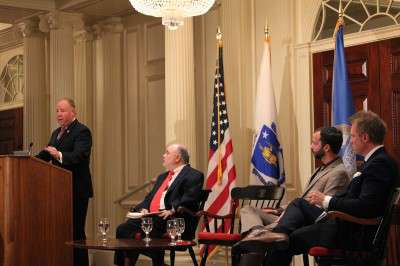
Launching off a two-day conference about rising sea levels, several city leaders addressed concerns about the future of coastal cities at a conference Thursday night co-hosted by Boston University’s Initiative on Cities and the Frederick S. Pardee Center for the Study of the Longer Range Future.
The panel, moderated by WBUR anchor Bob Oakes, included Mayor J. Christian Bollwage from Elizabeth, New Jersey, Councilor Arron Wood from Melbourne, Australia and Boston’s Chief of Environment, Energy and Open Space Brian Swett.
Boston Mayor Martin Walsh was scheduled to attend, but was not present.
“Climate change is real, and mayors see that,” Bollwage said. “The skeptics are people who don’t deal with the issue and clearly have the ability to pontificate.”
The conference will continue Friday as scientists, city officials, businesses and schools gather to develop strategies geared toward protecting and sustaining coastal cities.
“We need to do a better job of planning beforehand so that when things are happening, when we have that disaster hit us, we understand how we rebuild in a smart way, and we’re not rushing to rebuild homes and get people in there,” Swett said.
Bollwage said the lack of proper infrastructure during Hurricane Sandy made storm recovery a more difficult challenge.
“The power in a lot of areas is below ground, and when they got flooded out, it became extremely difficult to get there to repair it,” he said. “We learned more in preparation after the storm than we ever did before the storm. You learn more afterwards to prepare for the next one. We’re prepared.”
Wood said Melbourne has faced difficulties in preparing for flooding, heavier rainfall, rising sea levels and heat waves as a result of climate change.
“We’re slowly getting through to people that this threat posed by overland flows, even sea levels rising, can be a huge opportunity, again, to redesign our cities better, to be more about a sense of community,” he said.
The city of Boston needs reliable infrastructure that will last through climate change, Swett said.
“Let us [leaders] have a realistic conversation of what we’re going to spend for reliability and preparedness for our infrastructure, whether it be electricity or water or transportation,” he said. “How much more are we willing to pay for reliability?”
Getting people to care more about the issue of climate change and sea level rise is the best way to get people involved, Wood said.
“Fear is a little bit of a motivator. You can shock someone…but then they’ll go out and they’ll forget about what they’re shown,” he said. “You can motivate people on a much longer term if you motivate them with hope and optimism and a belief in a bright future.”
Several attendees said they learned a lot from the discussion and are hopeful about how leaders will continue to address issues that threaten coastal cities.
Suchi Gopal, a professor of earth and environment at BU, said she believes the key to climate change rests in educating the community.
“Education is key,” she said. “We need to incorporate more and more of this in the conversation. We really need to understand what is it that people want. It cannot be all about melting glaciers. It’s happening here. Sandy is not a storm. Sandy is a sign of climate change.”
Julie Wormser, the executive director of the Boston Harbor Association, said she is concerned about how realistic it will be to get communities on board with paying for climate change.
“If you don’t have a community that is engaged…nothing is going to change,” she said. “It depends basically on who benefits and who pays… I don’t believe that people actually don’t believe in climate change at the policy level. It’s just that if they admit it, there’s money attached. It’s more that ‘If I say yes, then I have to do something about it.’”
Sarah Chung, 33, a BU alumna and Brookline resident, said it was reassuring to see what leaders of coastal cities are doing to address sea level rise and climate change.
“I have a lot of respect for them because they really care and are trying their best to make the city a better place,” she said. “In their desire to start conversations about planning for the future, they’re doing the best that they can. They’re in the right position to do it. It was great to hear the mayor be so on board. I’m interested in climate disasters and food security.”



















































































































